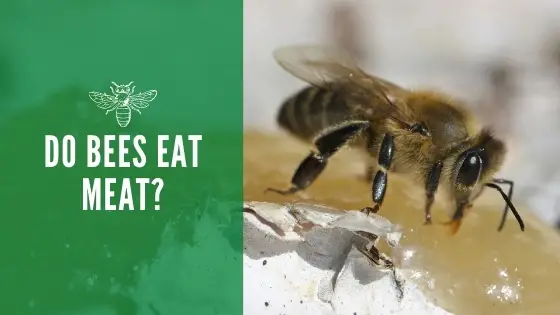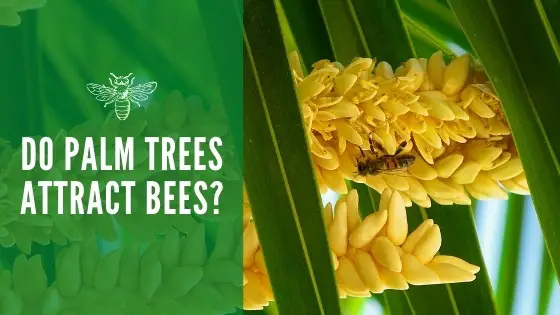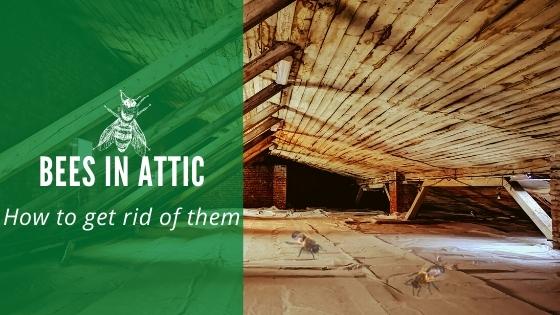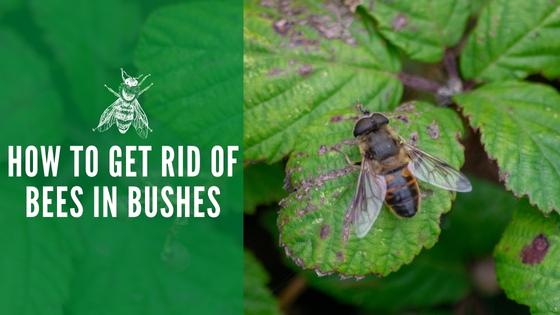Do Bees Eat Meat?

When you think of bees, you generally think of honeybees gently traveling from flower to flower collecting pollen, or you think of those barbeque pests in the wasp family.
We all know that wasps are attracted to sugary things like pop, ketchup, and sweets, but did you know that some of them eat meat and might be after your hamburger? Let’s explore the diet of these bees and what kind of bees eat meat.
What Kind of Bees Eat Meat?
The world is home to over 20,000 species of bees, and approximately 4,000 of them live in the United States. They are in many different sizes, colors, and shapes. They also have different dietary requirements.
Many people think of the gentle honeybee as a vegetarian surviving only on nectar. Recent research has shown that they are not necessarily vegetarian, but they are omnivores. Along with the pollen and nectar, they also consume microbes.
To scientists’ surprise, they found that honeybees consume enough of these microbes to be considered an omnivore. They also found that these are not just dietary supplements, but the honeybees need this microbial protein source to survive.
What are Vulture Bees & Where do They Live?
Vulture bees, also called carrion bees, are a fascinating species with a particular affinity for meat. They prefer rotting meat, which is different from other wasps that tend to prefer their meat fresh. They cannot sting and use their mandibles to remove the meat from the source. Vulture bees are not particularly important for pollination, and they have received little attention from the scientific community.
Like their social cousins, they generally live in small hives. They have an appearance similar to a yellowjacket or hornet and are often mistaken for them. They crawl inside the carcass through the eyes and coat the meat with saliva. Then, they swallow it and store it in a special foraging stomach. They regurgitate the pre-digested rotting flesh back to their young.
They will also store meat in the form of “meat” honey as opposed to nectar honey. It is not known if the “honey” is edible or if it is safe. After all, it is made from rotting flesh, so it does not sound that appetizing. They will often build nests on top of the rotting corpses of animals.
Vulture bees are stingless, but if they feel threatened, they will launch an attack with their mandibles and take a bite of you in the process. You can find these gentle foragers throughout North and South America. They only live in the southern states of North America.
Do Wasps Eat Meat?
When you think of bees eating meat, you usually want to know why the wasps at your picnic seem to be as interested in your chicken as you are. Most adult wasps consume nectar for their own sustenance, but their larvae need a protein source. The usual diet consists of insects that they will kill and bring back to their nest to feed their young.
Wasps will search for any type of protein they can find, and the less they have to work for it, the better. It takes much less energy to grab a bite of your steak than to take down a large insect. When you are grilling meat outside, the wasps will pick up the scent.
Once you have finished your meal, they will crawl inside and consume scraps of leftover meat once the grill has cooled down enough for them to do so safely. Wasps will readily consume dead animals, such as fish, snakes, rodents, or insects.
Wasps have a specialized mandible that can cut things into tiny pieces so they can take them back to their nest. Their mandible is like a pair of pinchers or scissors with sharp edges that they can use to slice off the pieces of the meat. They can then carry it back to their nest for their young.
Why Do Insects Eat Meat?
Wasps are divided into solitary wasps that live alone and social wasps that live in colonies. Both types eat meat. The adult wasps do not consume the meat themselves, but their larvae must have it to grow. If a wasp lands on your chicken and slices off a piece, then you know there is a nest close.
When it comes to killing live prey, wasps have several different mechanisms for doing so. Some of them use their mandibles to take bites out of their prey until they bleed to death. Some wasps, such as the spider wasp, have venom to paralyze their victims and carry them back to their nests alive.
Their young will consume the unfortunate insect while it is still living but unable to move. Solitary wasps are more likely to feed prey to their young alive than social wasps. Most social wasps will chop their prey into small pieces before feeding it to their larvae.
One thing you might not know is that most wasps only live for between 12 and 22 days. A 22-day lifespan is the most common for an adult female worker. The queen can live up to one year. The life span begins when a new queen is born and ends when the queen dies at the end of the season.
Food is the main factor that determines whether the colony survives the winter or not. Most species of wasps will cannibalize a fallen comrade, and they are not picky about their food source. Some males will engage in lethal combat, and the winner will devour the components of the loser.
Hornets will cannibalize other colonies, but yellowjackets will cannibalize members of their own colony in this manner. This is a way of eliminating the weaker members of the colony in times of food shortage.
How Do You Keep Wasps Away from Your Food?
As a rule, when you see an adult feeding on nectar or sugary sweets, they are feeding themselves. When you see them going for your meat, they are more than likely feeding a nest nearby. In both cases, removing whatever it is that they are attracted to will help deter them.
Otherwise, they can be quite determined when it comes to obtaining food for themselves or their young. Typically, they will not sting you unless you try to swat them away or they feel threatened.
Wasps are more interested in obtaining food for themselves or their young, and they will only attack you if they see you as a threat. They will usually just get what they need and then fly off again.
In doing so, they will also tell the rest of their colony where the food source is, which means that as soon as you see one wasp take a piece of meat can fly away, you can count on them returning with a few more of their friends as long as the food source remains.
One thing you need to be aware of with social wasps is that if you swat them and become aggressive, they will send out pheromones that call in the troops. When these troops arrive, they will be armed and ready for a fight.
They believe that they are protecting their nests and their young. The best thing to do is allow the wasp to get their fill and remove the food source after they fly away. If the wasps return and find nothing to eat, they will move on and search elsewhere.
Now, you know a little more about why bees/wasps eat meat and why they love barbeques as much as you do. You also know a little more about their behavior and how to keep them away. Meat-eating bees are fascinating, and the more we know about them, the more we can adjust to life with them.



